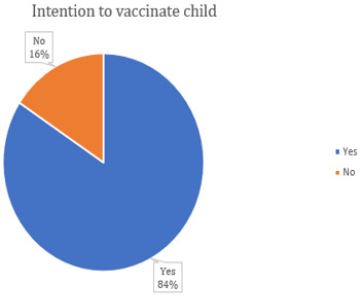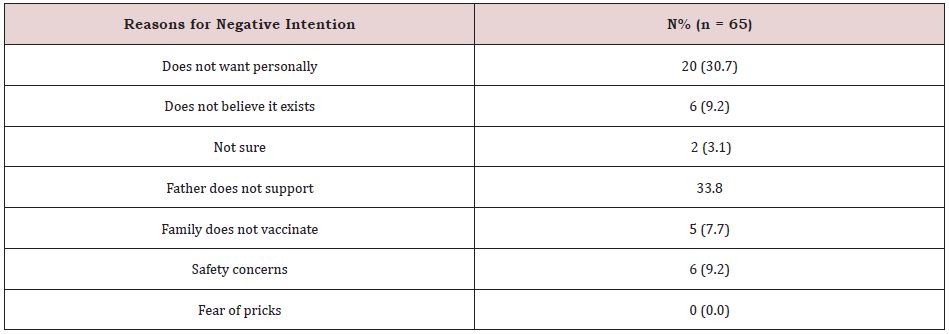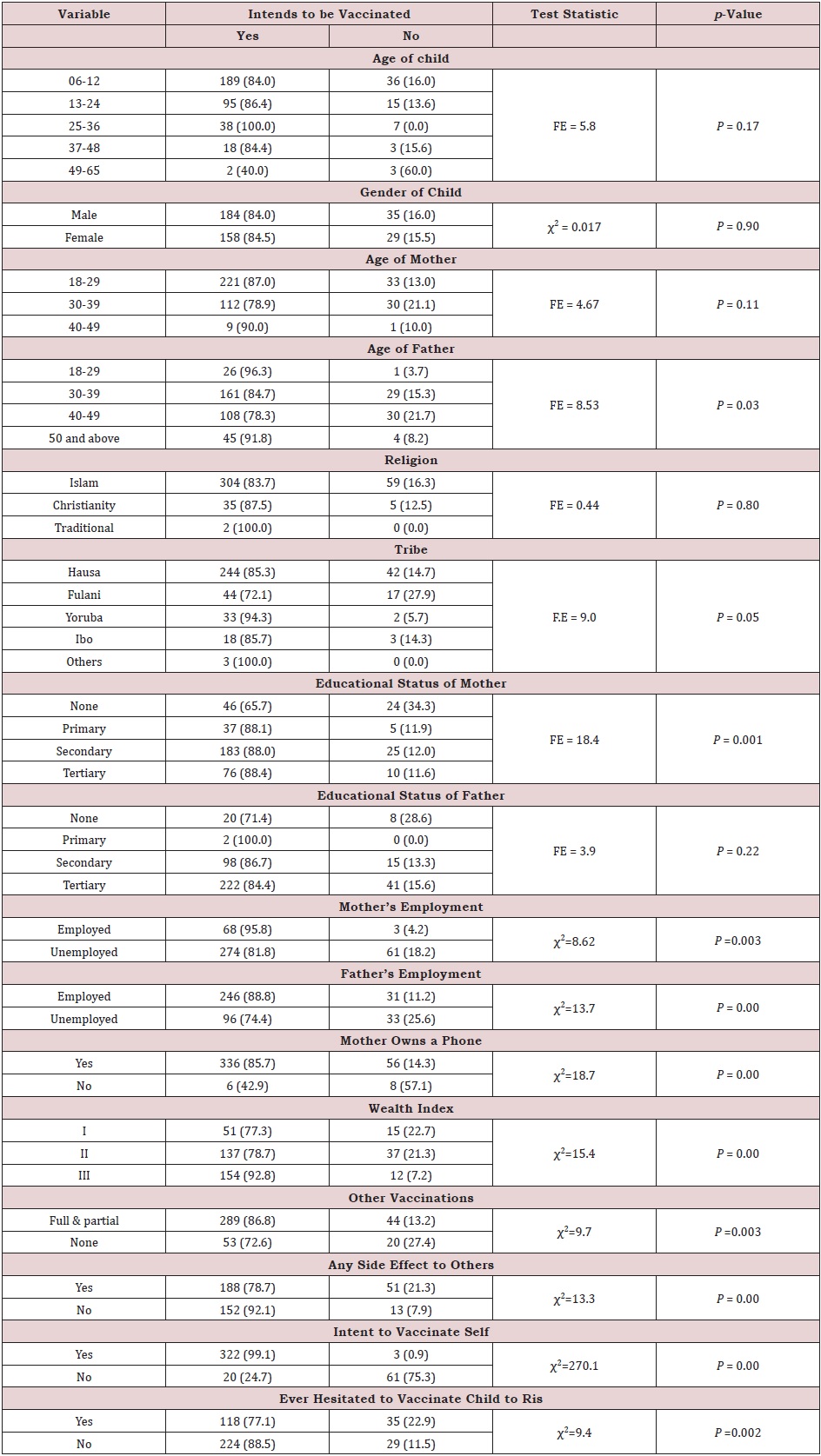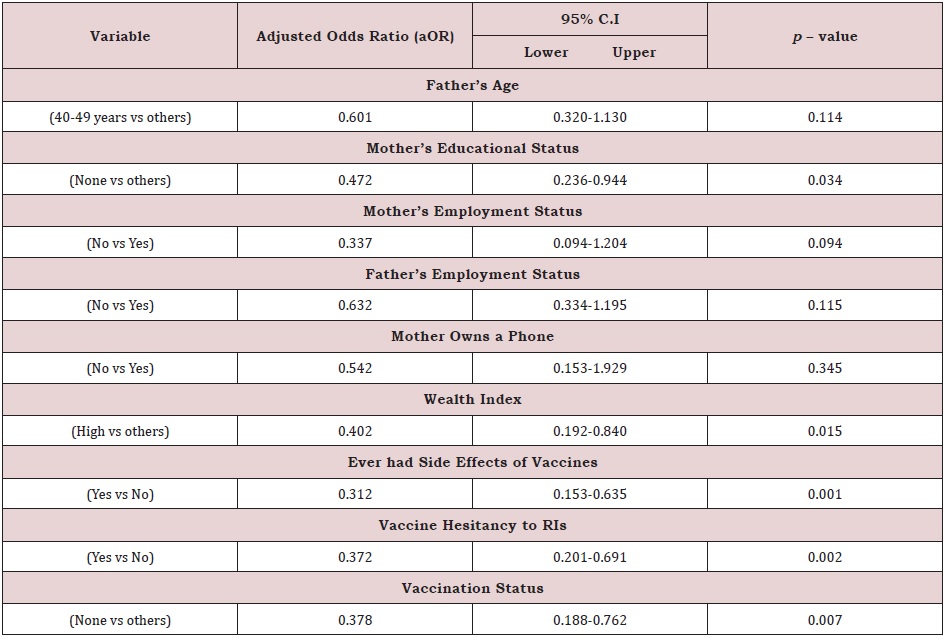Predictors of Intention for Childhood Covid-19 Vaccination Among Mothers of Under Fives in A Semi-Urban Setting in Sokoto, Nigeria
ABSTRACT
Introduction and Objectives: Even though COVID vaccines are not yet widely available for children, several clinical trials are
being undertaken especially as vaccinating children is a very important factor in attaining herd immunity. However, little research
has been conducted to examine parents’ intention to vaccinate their young children for COVID-19 in under-served countries
including Nigeria.
Materials and Methods: A cross-sectional study conducted among mothers of under five children receiving care in health
facilities as part of a study conducted on vaccine hesitancy. Responses on their vaccine intention regarding COVID-19 for their
children, reasons for the negative intention and their predictors were assessed. Data was analysed using IBM SPSS version 25.
Results: Majority (341/406; 84%) had a positive intention to vaccinate their children. The remainder who had negative intention
mainly attributed it to the lack of their husband’s approval as well as not wanting to take the vaccine for a novel disease they did
not understand. Fathers aged 40-49 years, mothers with no education, mother’s non-ownership of phone, unemployed parents, low
wealth index, vaccine hesitancy, lack of routine immunization (RIs) and previous side effects to RIs were all significantly associated
with negative vaccine intention. However, significant predictors of negative intention were mothers’ low educational status (p=0.03),
low wealth index of family(p=0.02), vaccine hesitancy to RIs (p=0.002) and side effects to previous RIs(p=0.003).
Conclusion: Majority of the mothers had positive intention to vaccinate their children. However, uneducated mothers from
poorer families and those who had negative sentiments to RIs were more negatively disposed to COVID vaccine.
KEYWORDS
COVID vaccine; Negative; Intention; Mothers; Under-Fives; Sokoto
INTRODUCTION
Since the onset of the COVID Pandemic in 2020, there have been a lot of varying perceptions on the disease which have led to vaccine hesitancy and apathy [1]. Despite this, the government and other relevant authorities have not relented in encouraging vaccination and other protective measures among the populace [2]. Even though vaccines are not yet available for children, several clinical trials are being undertaken especially as vaccinating children is a very important factor in attaining herd immunity [1]. However, little research has been conducted to examine parents’ intention to vaccinate their young children for COVID-19 in Nigeria. With the persistence of the pandemic and discovery of newer variants, efforts are necessary to upscale vaccination especially within areas known for poor patronage of routine vaccination [1]. This study carried out amongst mothers of under five children attending health centres in Sokoto township, Nigeria to assess their intention to vaccinate their children against COVID-19 infection as well as to ascertain the sociodemographic predictors of vaccination intention amongst them with a view to assist relevant agencies in planning and strategizing to achieve maximal vaccine coverage.
MATERIALS AND METHODS
Background Information on the Study Area
The study was conducted as part of the study of vaccine hesitancy to RIs amongst under-fives attending health centres in Sokoto metropolis [3]. It was a cross-sectional study amongst mothers of under five children receiving care in some health facilities in Sokoto metropolis. The participants were selected by multistage sampling technique from 18 health facilities comprising 3 tertiary facilities, 15 primary and secondary facilities. The data was collected included age, gender of child, educational, employment status of parents, wealth index of the family, routine vaccination status of child, vaccine hesitancy of parents, previous side effects to RIs and parents’ intent to vaccinate child against COVID.
Data Management
Data was analysed using the IBM Statistical Package for the Social Sciences (SPSS) version 25.0 software. Demographic data was presented using graphs and tables for frequencies and percentage of variables.
Bivariate analysis (χ2) was used to assess association between sociodemographic variables (education, employment status) and COVID vaccine intention.
Ethical Consideration
Approval for the study was obtained from research and ethics committee of Usmanu Danfodiyo University Teaching Hospital Sokoto and the Ministry of Health in Sokoto State. Consent was obtained from the respondents prior to recruitment and strict confidentiality was maintained of respondents’ identity.
RESULTS
Mother’s Intention to Vaccinate Child
Majority (341/406; 84%) had a positive intention to vaccine to vaccinate their children while 16% (65/406) had a negative intention as shown in Figure 1. Out of the 65 respondents, about a third 33.8% (22/65) attributed their negative intention to the father’s decision while 30.8% (20/65) attributed their intention to their own personal decision as they did not believe in the vaccine. About 9.2% (6/65) were concerned about safety of the vaccine and similar proportion felt the disease did not actually exist (Table 1,2).
Factors Affecting Intention to Vaccinate
The factors significantly associated with relatively high proportion of negative vaccine intention were father’s age of 40 -49 years (p=0.03), mothers with no education (p=0.001), unemployed parents (p=0.003), low wealth index (p=0.00), nonownership of phone by mother (p=0.01), vaccine hesitancy/ no routine immunizations (RIs) (p=0.001) and previous side effects to RIs (p=0.01). The factors that were not related to vaccine intention were age of mother, religion, tribe, and father’s educational status. The significant predictors of negative intention were mothers’ with no education) as they were 53% more likely to have negative intention, low wealth index of family as they were 60% more likely to have negative intention. Vaccine hesitancy (if present to RIs) and ever having side effects (to RIs) were about 64% more likely to have negative intention (Table 3).
DISCUSSION
The proportion of negative vaccine intention among mothers of children in the semi-urban area was relatively low. Lower proportion of older fathers had negative intention to vaccinate their child. Younger mothers had more negative vaccine intention similar to Kreuters [4] finding in Florida where younger and black mothers were less likely to plan to vaccinate their children. They had more negative language towards vaccination probably due to their inexperience and low educational status. In this study also, the educational status of the mothers was also relatively lower than that of the fathers as majority had secondary education.
On the other hand, reasons for negative intention on the part of the mothers was mainly fathers’ refusal of vaccination while in Kreuters study mothers were more concerned about paying bills than preventing COVID-19 [4]. In another U.S study on COVID-19 vaccination intentions, concerns, and facilitators among parents [6] about half had negative intention to vaccinate higher than this study despite being predominantly well educated. Identifying as female was associated with lower COVID-19 vaccination intention in another study by Ellithorpe [5]. The main reason given was also not unexpected which was concerns about side effects given the wider use of the vaccines in developed countries when compared to the setting in African countries and among other disadvantaged population where initially they were not readily available. Among the mothers in this study concerns for side effects were lower among those with negative intention probably due to low general uptake of the vaccine in Sokoto [6,7].
In this study, apart from the mother’s educational status, other parameters as being unemployed, non-ownership of a mobile phone and low wealth index of the family were all associated with negative vaccine intention. In a similar study, non-Hispanic women who were younger, and did not have a college education showed lower willingness to immediately vaccinate children compared other parents without these characteristics. It was found that mothers who had a child with previous reactions or side effects to the RIs were negatively disposed to the vaccine as well as those who were already hesitant to receive the RIs. This was quite opposite to findings by Kreuter [4] where those who had children that recently received a shot of influenza vaccine were more likely to express COVID-19 vaccination intention for their young child. Aldakhalil reported in Saudi Arabia that vaccine hesitancy towards childhood immunizations was a predictor of mothers’ non-intention to vaccinate their children against COVID-19. Another systematic review in Nigeria found that low acceptance of the vaccine was a result of propaganda, adverse effect concerns, and conspiracy theories [8].
CONCLUSION
This study showed majority of the mothers had positive intention to vaccinate their children. However, uneducated mothers from poorer families and those who had negative sentiments to RIs were more negatively disposed to COVID vaccine. It is advocated that greater efforts should be put in place to tackle the unwillingness of the fathers and young mothers to receive the COVID-19 vaccine. This is especially given the backdrop that it is being seriously advocated that policy makers in institutions should include African children in their COVID-19 vaccine guidelines and procurement due to their higher vulnerability to death in the face of infection.
REFERENCES
- Sam-Agudu NA, Quakyi NK, Masekela R, Zumla A, Nachega JB (2022) Children and adolescents in African countries should also be vaccinated for COVID-19. BMJ Global Health 7(2): e008315.
- Aldakhil H, Albedah N, Alturaiki N, Alajlan R, Abusalih H (2021) Vaccine hesitancy towards childhood immunizations as a predictor of mothers’ intention to vaccinate their children against COVID-19 in Saudi Arabia. Journal of Infection and Public Health 14(10): 1497-1504.
- Isezuo K, Adamu A (2022) Vaccination hesitancy and refusal among parents of under-fives attending health facilities in Sokoto Metropolis using the WHO vaccine hesitancy tool. OALIB.
- Kreuter MW, Garg R, Marsh A, Thompson T, Caburnay C, Teshome E, et al. (2022) Intention to vaccinate children for COVID-19: A segmentation analysis among Medicaid parents in Florida. Preventive Medicine 156: 106959.
- Ellithorpe ME, Aladé F, Adams RB, Nowak GJ (2022) Looking ahead: Caregivers’ COVID-19 vaccination intention for children 5 years old and younger using the health belief model. Vaccine 40(10): 1404-1412.
- Scherer A, Gidengil C, Gedlinske A, Parker A, Askelson N, et al. (2022) COVID-19 Vaccination Intentions Among US Parents of Children Ages 6 Months Through 4 Years. JAMA Network Open 5(8): e2227437.
- Njoga EO, Mshelbwala PP, Abah KO, Awoyomi OJ, Wangdi K, et al. (2022) COVID-19 Vaccine hesitancy and determinants of acceptance among healthcare workers, academics and tertiary students in Nigeria. Vaccines (Basel) 10(4): 626.
- Olu-Abiodun O, Abiodun O, Okafor N (2022) COVID-19 vaccination in Nigeria: A rapid review of vaccine acceptance rate and the associated factors. PLOS ONE 17(5): e0267691.
Article Type
Research Article
Publication history
Received Date: November 09, 2022
Published: December 09, 2022
Address for correspondence
Isezuo KO, Department of Paediatrics, Usmanu Danfodiyo University Teaching Hospital, Nigeria
Copyright
©2022 Open Access Journal of Biomedical Science, All rights reserved. No part of this content may be reproduced or transmitted in any form or by any means as per the standard guidelines of fair use. Open Access Journal of Biomedical Science is licensed under a Creative Commons Attribution 4.0 International License
How to cite this article
Isezuo KO*, Adamu A, Jiya FB, Amodu-Sanni M, Garba BI, Falaye MA. Predictors of Intention for Covid-19 Vaccination for Children Among Mothers of Under Fives in A Semi-Urban Setting in Sokoto, Nigeria. 2022- 4(6) OAJBS.ID.000527.







